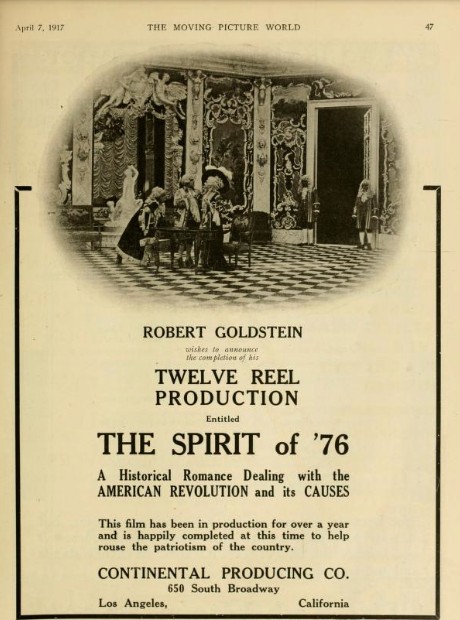Robert Goldstein and
The Spirit of '76
 The extremes to which movie censorship went in the United States is shown by the story of Robert Goldstein (1883-?) and The Spirit of '76.
The extremes to which movie censorship went in the United States is shown by the story of Robert Goldstein (1883-?) and The Spirit of '76.
Goldstein, a German immigrant, inspired by the success of Griffith's movie about the Civil War determined to make a film about the Revolutionary War. With World War I going on, he felt the time was right for a hyper-patriotic movie.
He made The Spirit of '76, a melodrama of seemingly jingoistic nationalism, in 1916 and released it in 1917, just a month or two after the U.S. had entered World War I.
He tragically miscalculated. Goldstein intended to rouse patriotism by showing scenes of British atrocities against Americans during the revolution...at least some of which were more-or-less true to history. However, when the film came out the British were allies of the U.S. and speaking any word against them was strictly forbidden. Goldstein was charged under the newly created Espionage Act and convicted on charges that he'd attempted to cause insubordination, disloyalty, and mutiny by U.S. troops. These charges were absurd. Goldstein was trying to make a patriotic film. Nevertheless, he was found guilty, sentenced to 10 years in prison and fined $5000 (the equivalent of $127,000 in January 2023). The sentence was upheld on appeal. He ended up serving 3 years in McNeil Island Penitentiary in Washington State.*
After his release, he left the U.S. and tried unsuccessfully to establish himself as a filmmaker in Europe. He returned to the U.S. in the mid 1930s and is lost to history after 1938.
The Spirit of '76 is one of history's many lost films, so we don't know what it really showed, but there was nothing it could have shown that would justify what happened to Goldstein.
Return to Hollywood Censorship Page
*As we have seen, the movies during this era were not protected by the first amendment. However, it is extremely important to understand that in the era 1917-1921, the courts interpreted the Espionage Act (which, by the way, is still in force) as allowing the negation of ALL civil rights. People could be and were jailed for unpatriotic private speech. The government repeatedly attacked organizations and publications it deemed disloyal (were talking about physical attack here... invading and destroying offices, beating up and jailing individuals) and it prohibited publications that criticized the government or war effort from using the mail, the only means of distribution most had. This repression continued after the war, until the end of the Wilson administration. All this is meticulously documented in Adam Hochschild's recent book American Midnight: The Great War, a Violent Peace, and Democracy's Forgotten Crisis 2022 and in many other places. And, little bit of local color...the U.S. chief censor during these years, who ruthlessly pursued all political speech with which he disagreed, effectively crushing leftist voices in the United States, was Postmaster General Albert S. Burleson (1863-1937) born right here in San Marcos. Burleson also re-segregated the postal service and fired Black postal workers in the south. Burleson has the distinction of being "the worst human being ever to serve as postmaster general." So, next time you're on Burleson St. in town here, you might think of that (though the street was named for Edward Burleson (1798-1851) his grandfather).